While the popular uprising against the Lukashenko regime is not abating, Russia faces the dilemma whether to intervene or not to intervene. According to Russia-expert Hannes Adomeit it is unlikely that Russia will just wait and consent to a new government, as it did in Armenia. Russia might look for a Belarusian Jaruzelski or resort to hybrid intervention. The attittude of the West hardly has any impact: domestic political considerations will determine Russia's behaviour.
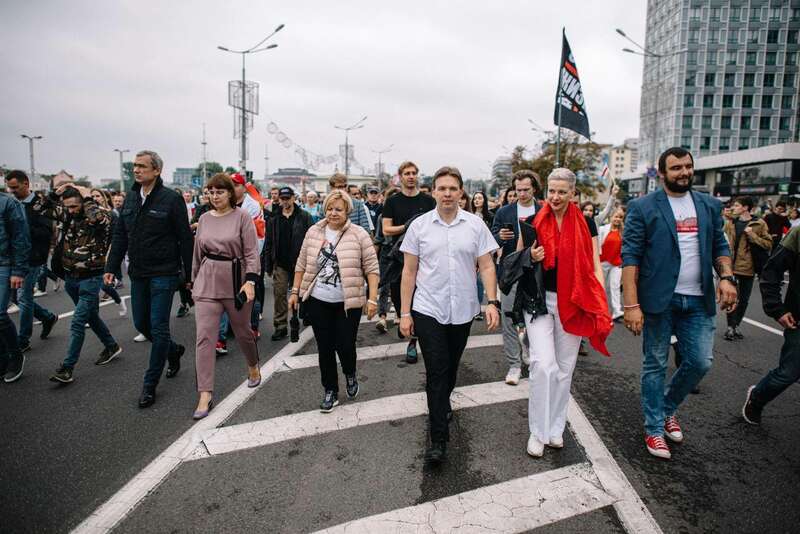 Members of the Belarusian Coordination Council leading demonstration in Minsk. Photo fb/belrada.vision
Members of the Belarusian Coordination Council leading demonstration in Minsk. Photo fb/belrada.vision
door Hannes Adomeit
Yet another wave of the ‘colour revolution’ has swept into the Kremlin’s self-declared sphere of influence in Europe. Quite unexpectedly it has infected Belarus. Its power structures seemed to be firmly resistant to the plague. The Lukashenko regime, in power since 1994, appeared completely inured to the − from the perspective of authoritarian systems on post-Soviet space − deadly disease. The initial reactions from Moscow, both official and in the media, correspondingly indicated that the Kremlin was completely surprised by the course of events. Reflecting business as usual, Putin (like Xi Jinping) lost no time to congratulate his counterpart upon his alleged victory.
The threat to the viability of the regime and Lukashenko’s grip on power has been underlined by the fact that that the mass demonstrations have encompassed not only young people and professionals from the urban middle class but also blue collar workers of state enterprises. From Putin’s perspective, it has become quite possible that the alleged winner in a fraudulent election would again be swept away, just like Georgia’s Eduard Shevardnadze in 2003 and Ukraine’s Viktor Yanukovich in 2004 and 2014. The threat to the legitimacy of his regime must appear to him even more acute as the mass demonstrations in Belarus have coincided with tens of thousands of people in Russia’s Far East province protesting against the arrest of governor Sergey Furgal on several 15-year-old murder charges that his supporters believe were politically motivated.
Putin understands lasting consequences of intervention
Considering this dual threat and his own experience concerning the toppling of the East German communist regime in 1989 when he was a KGB agent in Dresden and the mass demonstrations in Russia following the fraudulent December 2011 parliamentary and March 2012 presidential elections, it would seem logical to assume that the concern with Lukashenko being chased from power and a democratic, presumably western oriented Belarus will necessitate Russian intervention, military intervention if need be. However, there is a wide-spread opinion that the Georgian and Ukrainian examples are incorrect precedents to draw on; that there are many factors making intervention unlikely; and that the proper example to look at are not the Russian military interventions in Georgia in 2008 and Ukraine in 2014 but Armenia in 2018, that is, the absence of intervention in response to the popular demonstrations and the consent to a government under a new prime minister as demanded by the people.
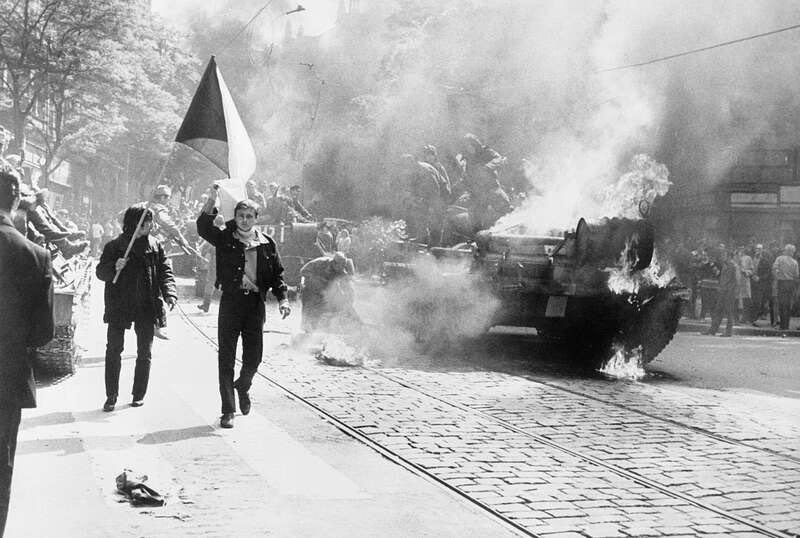 Soviet invasion of Prague in 1968. Photo wikimedia commons
Soviet invasion of Prague in 1968. Photo wikimedia commons
The line of argument that Putin can live with a popularly elected government in Belarus and that this is one of the reasons why he won’t intervene can be supported by what he said in his autobiography of sorts published in 2000 under the title of Ot pervogo litsa (First Person in English). The question was put to him as to whether he thought that the Soviet interventions into Hungary in 1956 and Czechoslovakia in 1968 were big mistakes. Yes, they were, he replied. ‘And you didn’t even mention that we used force in East Germany in 1953. [. . .] They were all big mistakes, in my opinion. And the Russophobia that we have today in Eastern Europe, that’s the result of those mistakes.’
Putin ‘knew well’, as Fiona Hill and Clifford Gaddy comment on in the second edition of their book on Putin, that acts of aggression against another country, no matter what the motivation, have lasting consequences; that they create resentments and new grievances that persist for decades and shape the attitudes and policies of subsequent generations.
To extend this argument, Russia’s current neoimperialist policies, including the self-asserted claim of post-Soviet geopolitical space being a Russian sphere of interest, resemble those in the era of Soviet imperial control over its East European satellites and the ‘Brezhnev Doctrine’ of limited sovereignty. However, despite the erosion of the monolithic power of the Polish communist party and its forced toleration of dual power with Lech Wałęsa’s anti-communist Solidarność movement, Soviet party leader Leonid Brezhnev’s Politburo failed to intervene in Poland in 1980-1981.
The argument that Russia will not intervene, at least not militarily, to save the Belarusian regime is based on several considerations.
Why Russia allegedly will not intervene
- Putin’s relations with Lukashenko have always been tense. The latter has frustrated Moscow for a long time. He has played the European Union card to extract Russian economic financial concessions; refused to endorse the Russian annexation of the Crimea; rejected Russian demands for the establishment of a Russian air base in the country; shoved aside Putin’s demands for deeper integration and implementation of the 1999 treaty for the creation of a Union State with a common head of state, legislature, army, citizenship and currency; and arrested 33 of a total of 200 alleged mercenaries of the Kremlin-backed Wagner Group, a ‘private’ military company, asserting that they had entered Belarus in order ‘to destabilize the situation during the election campaign’. It is not surprising, then, that Putin’s press secretary Dmitry Peskov advised against ‘simplifying’ Lukashenko and equating the Belarusian president with all pro-Russian forces in Belarus, clearly implying that they are other leaders who could serve Russian interests equally well or better.
- The protests against Lukashenko are not anti-Russian. Polls have shown that 70% of respondents are happy with the state of Russian-Belarusian relations, only 5 to 7% think differently. In another poll, 90% of Belarusians wanted to be on some kind of friendly terms with Russia (10% preferred a more ‘neutral’ relationship; just 0.2% wanted relations to be ‘hostile’). This fact stands in contrast to Ukraine’s Orange Revolution of 2004 and the Euromaidan uprising of 2014 which drew on nationalist sentiment. Earlier political upheavals, notably the Baltic independence movements in 1989-1991 and Georgia’s Rose Revolution of 2003, also had significant nationalist and anti-Russian undertones. What is happening in Belarus doesn’t.
- Belarus is an orderly and disciplined society with a highly educated population. Suppressing demonstrations of such large scales by force no longer appears to be an option. Lukashenko tried a crackdown but it only spurred more demonstrations.
- It is highly unlikely that Russian military, intelligence or secret police are telling the Kremlin that pacifying the Belarusians will be a low-cost operation. A large-scale occupation force may be required to suppress dissent. The leaders of the Russian military and internal security forces may not even be sure whether their Belarusian counterparts would stand with them.
- Intervention would mean, as Americans political jargon has it, that Russia would 'own' the Belarus problem. Rather than achieving its aims of ending the perennial subsidization of the Belarusian economy, it would have to pour resources into stabilizing political and economic conditions.
- Given the alienation and erosion of Putin’s Russia image even in Russia-friendly Germany, the cost of intervention that could be incurred in the West could be severe, exceeding by far the sanctions regime imposed on Russia by the European Union.
Whereas these are valid reasons why Russian military intervention is unlikely and Putin can for the most part be considered to be a cautious politician weighing costs and benefits in decision-making, there are a number of factors precisely in his calculations and that of the Russian power elite that could tip the scales towards intervention, including with military force.
Colour revolution
The threat of Russian intervention has clearly been expressed by foreign minister Sergey Lavrov in his interview with national television Channel 1 on 19 August. Russia, he said was ‘troubled by the attempt to use the internal difficulties which Belarus, its leadership and its people are facing to interfere in these events − and not just interfere but impose conditions on Belarus which external actors consider advantageous to themselves. […] Nobody is hiding that we are talking about geopolitics, about a struggle for the post-Soviet space. We saw that struggle […] after the Soviet Union ended its existence. The last example, of course, was Ukraine.’
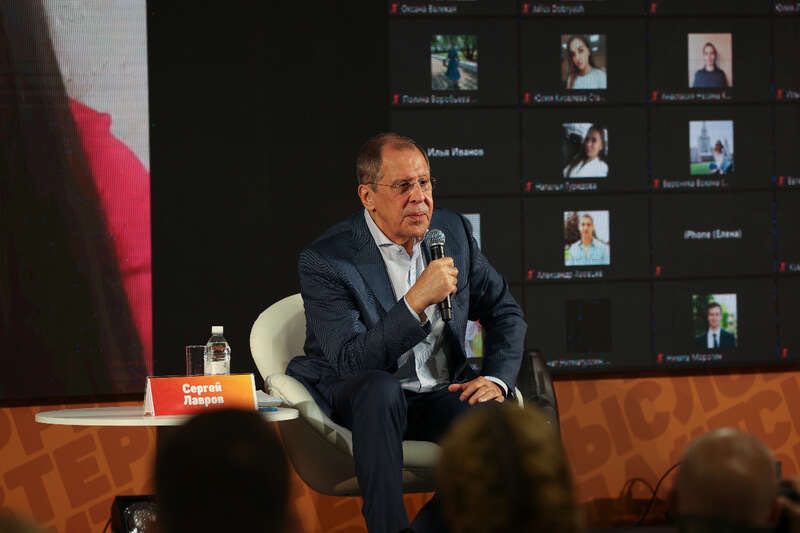 Foreign minister Sergey Lavrov answering questions avout Belarus, 23 August. Photo mid.ru
Foreign minister Sergey Lavrov answering questions avout Belarus, 23 August. Photo mid.ru
Lukashenko has claimed that Lithuania, Latvia and Poland are conducting a 'build-up of military might at our borders'. Using the occasion of a visit to a military firing range near Grodno on 22 August, he reiterated his assertion that the demonstrations followed the ‘script’ of the colour revolutions: ‘Everything is clear. As we thought, everything is according to the plan of color revolutions, with whipping up domestic political tensions in the country. […] The hallmark of the situation is the use of the external factor.’ Plenty of statements by Western states had made it clear that they were financing and supporting the opposition, but ‘military support’ was also evident: ‘NATO forces are moving to the borders.’ He called on the defense ministry’s leadership to take ‘the toughest measures for protecting the country’s territorial integrity’ and to pay special attention to protecting the western part of the country, including Grodno, ‘the western jewel in the crown of Belarus’.
In the telephone conversations with Putin on 14, 15, and 16 August, Lukashenko has in all likelihood used the same argument of external threat and direct interference by NATO countries to impress upon Moscow the necessity of providing strong support to him. As if in response to such entreaties, TASS reported as early as on 16 August that the two leaders had discussed the situation in Belarus ‘including the external pressure on the republic. Russia confirmed [its] readiness to provide necessary assistance in ironing out emerging problems [in Belarus] based on the principles of the treaty on creating the Union State and also if needed in the framework of the Collective Security Treaty Organization’.
The argument of the political necessity and treaty obligations to assist an ally to counteract alleged military intervention or threats thereof by NATO countries is but a repetition of the justifications used by the Soviet leadership in Hungary in 1956 and Czechoslovakia in 1968. History, in that way, is repeating itself. The actual perceived ‘threat’ in Soviet times, like today, was not one of actual or potential military intervention but internal popular uprisings directly putting at risk the Moscow-imposed political, economic and social system in a neighbouring country and thereby indirectly but inevitably threatening that of the imperial center. The Soviet leadership, faced then with the ‘Prague Spring’, was perfectly well aware of the fact that internal changes have foreign policy consequences. The establishment of a successful liberal democratic system would inevitably have moved the country westward in foreign policy.
Putin, confronted in 2014 with the Maidan revolution, was equally aware of the very fact of internal changes shaping foreign policy and the risk of these ‘spilling over’ into Moscow’s self-declared sphere of influence. Without any doubt he is aware of it today in view of the erosion of the Putin-style system in Belarus. To that extent, the conflict between Russia and the West, like in the Soviet era, has again assumed a systemic or ideological quality. In Europe it has pitted countries with democratic institutions, independent judiciaries, market-economies with fair competition and an active civil society, acting in a voluntarily agreed-upon regulatory environment and respect for international law, against a country that has returned to authoritarianism, suppression of dissent, corruption, legal nihilism and militarism, including the use of force abroad in violation of principles of international law.
Suppression by Belarussian hands
The Soviet era, notably the rise of Poland in 1980-81, is also instructive when pondering the dilemma that Moscow is confronted with in its responses today in Belarus. As the documented deliberations of the CPSU Politburo of that period show, the Soviet leadership went back and forth in their arguments. On the one hand, they thought that they had to intervene because the Polish communist party proved incapable of coping with the rapid erosion and likely collapse of its power in the country, with all its repercussions in the bloc. But on the other hand they felt that they could not intervene because the invading forces would in all likelihood face massive opposition leading, in contrast to Czechoslovakia in1968 but along the lines of the intervention in Hungary in 1956, to significant bloodshed. In the end, the dilemma was solved by what came to be known as ‘internal intervention, that is, the imposition of martial law by Polish defence minister General Wojciech Jaruzelski.
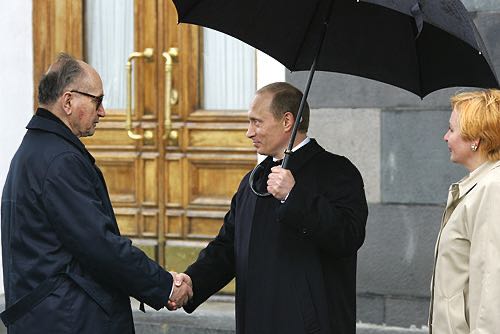 Putin welcomes general Jaruzelski in Moscow in 2005 as a guest to the WWII Victory celebrations. Photo wikimedia commons
Putin welcomes general Jaruzelski in Moscow in 2005 as a guest to the WWII Victory celebrations. Photo wikimedia commons
This may be the pattern that Putin would like to follow. A Belarusian Jaruzelski, however, is as yet not in sight. In the absence of a leader emerging to do the dirty work, Moscow will most likely find ways to maintain control and prevent the dismantling of the Belarusian power structures.
Hybrid intervention
Intervention short of the use of military force is on-going. An example of this, publicly announced, are the Russian television specialists that have been flown to Minsk to maintain service as Belarusian staff continued to strike. It is probable, furthermore, that in their telephone conversations Putin and Lukashenko discussed and potentially agreed on the format of Russian assistance to handle various contingencies in the evolving situation. According to the Polish-based International Strategic Action Network for Security (ISANS), ‘Russian assistance in the form of hybrid intervention was launched on approximately 17 August. On 18 August, two groups of Russian political, military, security, and media advisers arrived in Minsk from Moscow to take control over the situation in Belarus in key public and governing areas (media, social and political sector, army and security agencies). Russian advisers now target all key fields of Belarusian life.’ On 19 August, according to Ukrainian sources, flight tracking data showed that a Russian government ‘command and control’ aircraft used by the Federal Security Service (FSB) and its director, Alexander Bortnikov, arrived in Minsk and left the following day.
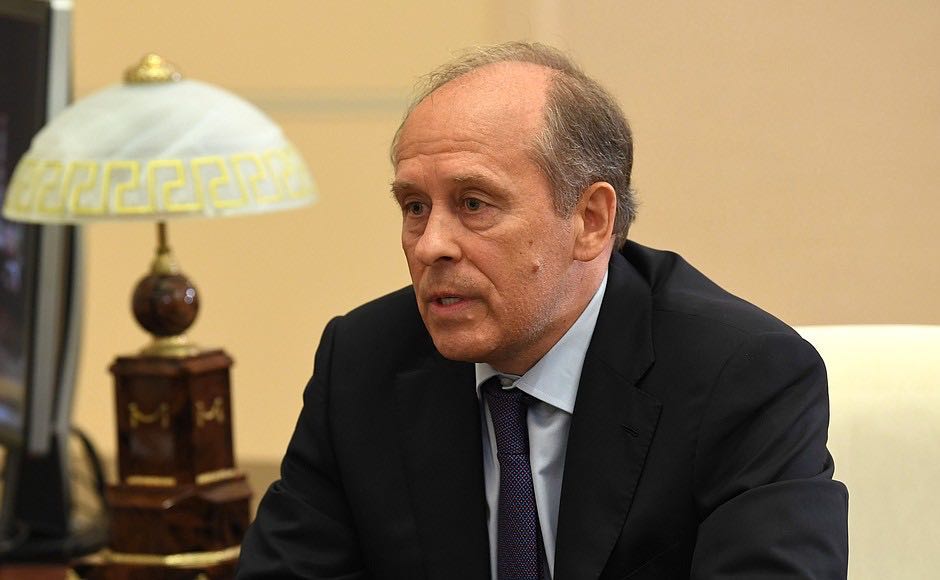 FSB director Alexander Bortnikov possibly flew to Minsk. Photo Kremlin.ru
FSB director Alexander Bortnikov possibly flew to Minsk. Photo Kremlin.ru
A replay of Russian non-intervention in Belarus and consent to the change of government in Armenia, to conclude, is exceedingly weak. Belarus, unlike Armenia, shares a long border with its eastern neighbor. Given its apparently irreconcilable conflict with Azerbaijan over Nagorno-Karabakh, Yerevan’s freedom of maneuver is extremely limited. The external military threat it faces is real rather than artificially construed. The country, therefore, depends on Russian security guarantees, Russian armed forces and military bases in the country, and weapons deliveries. Belarus, in contrast, is not exposed to any external military threat but, in a geographic semicircle, is surrounded by four democracies posing a challenge to the authoritarian system established by its leader. The toppling of the Lukashenko regime by massive street protests would have significantly greater and in Putin’s eyes unacceptable repercussions on Russia than the deposition of Serzh Sargsyan which, in essence, only amounted to the replacement of an unpopular prime minister with one that was more popular.
Europe's dilemma
Europe, like Russia, is facing a dilemma. But it is completely different from than that faced by the Kremlin. Wedded to the principles enshrined in the 1990 Paris Charter for a New Europe, the Council of Europe and the OSCE it cannot possibly stand aloof and watch with benign interest what is happening in the country. What would seem to be appropriate would be tough sanctions against the perpetrators of violence, that is, those responsible for the beatings and torture in the prisons, and for electoral fraud; political support for the Coordination Council to help in the organization of a peaceful transition of power; and financial assistance to non-governmental institutions advocating democratic change. Yet any of these measures would be counterproductive. They would undoubtedly be used by the Kremlin and Lukashenka to say, ‘We told you so. Foreign agents are instigating and organizing unrest in the country trying to launch another “colour revolution”’ and to reiterate Lavrov’s statement that what it is all about in Belarus is ‘external actors’ (i.e. the EU and NATO) attempting to gain geopolitical advantage.
for the
The European dilemma and, in essence, powerlessness to influence the developments can be demonstrated by the EU’s reactions thus far. On 19 August, the European leaders held an emergency summit by telephone and said that they would not recognize the results of the election and would shortly impose sanctions on those who were involved in electoral fraud and repression of protests. While urging peaceful dialogue between the government and the opposition, they did not call explicitly for a rerun of the vote, as the opposition has demanded, but did offer to ‘accompany a peaceful transition of power in Belarus’. They also stated that the resolution of the crisis ‘must be found in Belarus, not in Brussels or in Moscow’, perhaps in a dialogue that might be initiated under OSCE auspices.
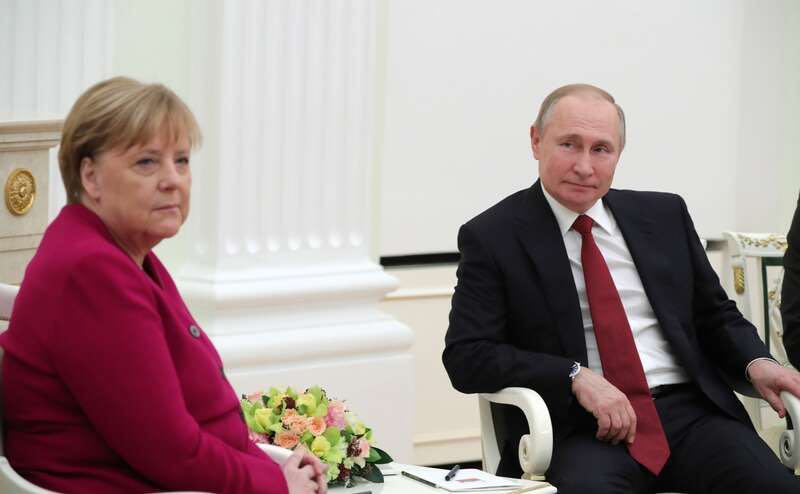 Chancellor Merkel visiting president Putin in Moscow, last January. Photo Kremlin.ru
Chancellor Merkel visiting president Putin in Moscow, last January. Photo Kremlin.ru
The day before, chancellor Angela Merkel − evidently in anticipation of the stance to be taken by the Council meeting, as Germany currently present holds the presidency − had called Putin and ‘made very clear’ to him that military intervention would further complicate the situation and that ‘Belarus must be able to determine its own path’. Speaking in Berlin after the Council meeting, she said that she did not see an immediate possibility for mediation to resolve the situation in Belarus. She had telephoned Lukashenko but he had refused to speak to her.
In view of such a frames of reference, European and American assurances of benign intentions are treated with derision in Putin’s Russia. At the same time, the imposition of sanctions will simply be used by the Kremlin’s propaganda machine to portray the West as perennially hostile to Russia. Deplorable as it may seem, what determines decision-making in Moscow is not so much the ‘external factor’ but domestic political considerations, notably what impact international events, above all in neighbouring countries, are likely to have on their own grip on power in Russia.
